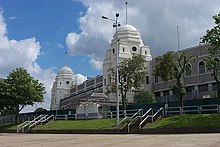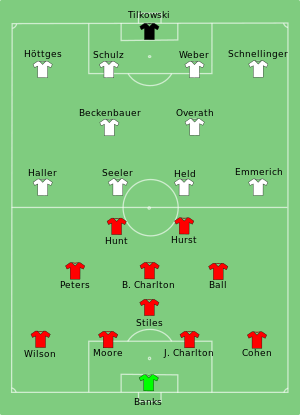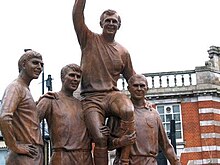1966 FIFA World Cup final
 | |||||||
| |||||||
| Afterextra time | |||||||
| Date | 30 July 1966 | ||||||
|---|---|---|---|---|---|---|---|
| Venue | Wembley Stadium,London | ||||||
| Referee | Gottfried Dienst(Switzerland) | ||||||
| Attendance | 96,924 | ||||||
| Weather | 20 °C (68 °F)[1] | ||||||
The1966 FIFA World Cup finalwas afootballmatch played atWembley Stadiumin London on 30 July 1966 to determine the winner of the1966 FIFA World Cup,the eighthFIFA World Cup.[2]The match was contested byEnglandandWest Germany,with England winning 4–2after extra timeto claim theJules Rimet Trophy.It was the first – and to date only – occasion that England has hosted or won the World Cup.
West Germany took the lead in the 11th minute whenHelmut Hallershot the ball into the bottom left corner when an English defender failed to clear the ball, beforeGeoff Hurstequalized with a header to make it 1-1, assisting a teammate who took a free kick. The score remained level by halftime until England took the lead with a 78th minute goal fromMartin Peters(who was the only player to be booked during the match). England almost won by full time before West German player,Wolfgang Weber,scored a 2-2 equaliser in the 90th minute. The game went into extra time, in which Geoff Hurst scored a controversial goal in the 101st minute in which some people thought the ball did not fully cross the line although the referee did agree it was a goal, to make the score 3-2 after the first 15 minutes of extra time, until Hurst scored again in the final minute to complete his hat-trick, ending the game 4-2 after the extra 30 minutes. He was the only man to score a hat-trick in a World Cup final untilKylian Mbappéscored one in the2022 final.
The match is remembered for England's only World Cup and first and only major international title,Geoff Hurst'shat-trick– the first scored in a FIFA World Cup final – and the dubious third goal awarded to England by refereeGottfried Dienstand linesmanTofiq Bahramov.The England team became known as the "wingless wonders", on account of their then-unconventional narrow attacking formation, described at the time as a 4–4–2.[3]
In addition to an attendance of 96,924 at the stadium, the British television audience peaked at 32.3 million viewers, making it theUnited Kingdom's most-watched television event ever.[4][5]
Road to the final[edit]
Both teams were strong throughout the tournament. Each won two and drew one of their three matches in the group stages. England did not concede a goal until their semi-final against Portugal.
| Round | ||||||||||||||||||||||||||||||||||||||||||||||||||||||||||||||||||||||||||||||||||||||||||||||
|---|---|---|---|---|---|---|---|---|---|---|---|---|---|---|---|---|---|---|---|---|---|---|---|---|---|---|---|---|---|---|---|---|---|---|---|---|---|---|---|---|---|---|---|---|---|---|---|---|---|---|---|---|---|---|---|---|---|---|---|---|---|---|---|---|---|---|---|---|---|---|---|---|---|---|---|---|---|---|---|---|---|---|---|---|---|---|---|---|---|---|---|---|---|---|
| Opponent | Result | Group stage | Opponent | Result | ||||||||||||||||||||||||||||||||||||||||||||||||||||||||||||||||||||||||||||||||||||||||||
| 0–0 | Match 1 | 5–0 | ||||||||||||||||||||||||||||||||||||||||||||||||||||||||||||||||||||||||||||||||||||||||||||
| 2–0 | Match 2 | 0–0 | ||||||||||||||||||||||||||||||||||||||||||||||||||||||||||||||||||||||||||||||||||||||||||||
| 2–0 | Match 3 | 2–1 | ||||||||||||||||||||||||||||||||||||||||||||||||||||||||||||||||||||||||||||||||||||||||||||
Group 1winner
|
Final group standings | Group 2winner
| ||||||||||||||||||||||||||||||||||||||||||||||||||||||||||||||||||||||||||||||||||||||||||||
| Opponent | Result | Knockout stage | Opponent | Result | ||||||||||||||||||||||||||||||||||||||||||||||||||||||||||||||||||||||||||||||||||||||||||
| 1–0 | Quarter-finals | 4–0 | ||||||||||||||||||||||||||||||||||||||||||||||||||||||||||||||||||||||||||||||||||||||||||||
| 2–1 | Semi-finals | 2–1 | ||||||||||||||||||||||||||||||||||||||||||||||||||||||||||||||||||||||||||||||||||||||||||||
Match[edit]
Summary[edit]
Normal time[edit]

England, managed byAlf Ramseyand captained byBobby Moore,won the toss and elected to kick off. After 12 minutes,Sigfried Heldsent a cross into the English penalty area whichRay Wilsonmisheaded toHelmut Haller,who got his shot on target.Jack Charltonand goalkeeperGordon Banksfailed to deal with the shot which went in, making it 1–0 to West Germany.

In the 18th minute,Wolfgang Overathconceded a free kick, which Moore took immediately, floating a cross into the West German area, whereGeoff Hurstrose unchallenged; his downward glancing header went into the net and levelled the scores at 1-1. The teams were level at half-time, and after 77 minutes England won a corner.Alan Balldelivered the ball to Geoff Hurst whose deflected shot from the edge of the area foundMartin Peters.He produced the final shot, beating the West German keeper from eight yards to make the score 2–1 to England.[6]
Germany pressed for an equaliser in the closing moments, and in the 89th minuteJack Charltonconceded a free kick for climbing onUwe Seeleras they both went up for a header.[6]The kick was taken byLothar Emmerich,who struck it intoGeorge Cohenin the wall; the rebound fell to Held, who shot across the face of goal and into the body ofKarl-Heinz Schnellinger.The ball deflected across the England six-yard box, wrong-footing the England defence and allowingWolfgang Weberto level the score at 2–2 and force the match into extra time. Banks protested that the ball had struck Schnellinger on the arm, and reiterated the claim in his 2002 autobiography,[7]but replays showed that it actually struck Schnellinger on the back.[8]
Extra time[edit]

England pressed forward and created several chances. In particular, with five minutes gone, Bobby Charlton struck the post and sent another shot just wide. With 11 minutes of extra time gone, Alan Ball put in a cross and Geoff Hurst swivelled and shot from close range. The ball hit the underside of the crossbar, bounced down and was cleared. The referee Gottfried Dienst was uncertain if it had been a goal and consulted his linesman,Tofiq BahramovfromAzerbaijanin the USSR, who indicated that it was, and the Swiss referee awarded the goal to the home team. The crowd and the audience of 400 million television viewers were left arguing whether the goal should have been given or not. The crossbar is now on display in the Wembley Stadium.[9]England'sthird goal has remained controversialever since the match. According to theLaws of the Gamethe definition of agoalis when "the whole of the ball passes over the goal line".[10]English supporters cited the good position of the linesman and the statement of Roger Hunt, the nearest England player to the ball, who claimed it was a goal and that was why he wheeled away in celebration rather than attempting to tap the rebounding ball in. Modern studies using film analysis and computer simulation have shown that the whole ball never crossed the line – only 50% did. Both Duncan Gillies of the Visual Information Processing Group atImperial College Londonand Ian Reid and Andrew Zisserman of the Department of Engineering Science atUniversity of Oxfordhave stated that the ball would have needed to travel a further 18±4 cm to fully cross the line.[11]Some Germans cited possible bias of the Soviet linesman,[12]especially as the USSR had just been defeated in the semi-finals by West Germany.[13]
One minute before the end of play, the West Germans sent their defenders forward in a desperate attempt to score a last-minute equaliser. Winning the ball, Bobby Moore picked out the unmarked Geoff Hurst with a long pass, which Hurst carried forward while some spectators began streaming onto the field and Hurst, as he later revealed, decided that, if he wasn’t going to score, he needed to boot the ball as far as possible, to prevent Germany getting back up.[14]The ball instead went straight to the top corner ofHans Tilkowski's net, sealing a historic hat-trick and winning the World Cup for England.[15]The goal gave rise to one of the most famous calls in English football history, whenBBCcommentatorKenneth Wolstenholmedescribed the situation as follows:
"And here comes Hurst. He's got...some people are on the pitch,they think it's all over.It is now! It's four! "[16]
One of the balls from the final is on display in theNational Football MuseuminManchester.
Details[edit]
| England | 4–2 (a.e.t.) | |
|---|---|---|
| Report[17] |
England
|
West Germany
|
|

|
| |||||||||||||||||||||||||||||||||||||||||||||||||||||||||||||||||||||||||||||||||||||||
|
Officials
|
Match rules
|
Aftermath[edit]
Champions photograph and statue[edit]

One of the enduring images of the celebrations in Wembley immediately after the game was the picture of the captainBobby Mooreholding the Jules Rimet Trophy aloft, on the shoulders of Geoff Hurst and Ray Wilson, together with Martin Peters. In recognition of Moore and otherWest Ham Unitedplayers' contribution to the win, the club and Newham Borough Council jointly commissioned a statue of this scene. On 28 April 2003Prince Andrewas president ofThe Football Association,duly unveiled theWorld Cup Sculpture(also calledThe Champions) in a prominent place near West Ham's ground, at the time, theBoleyn Ground,at the junction ofBarking RoadandGreen Street.The 13-foot (4 m)-high bronze piece was sculpted byPhilip Jacksonand weighed 4 tonnes.[18][19]
Cultural impact[edit]
Broadcasting and viewership[edit]


The final is themost watched event ever on British television,as of July 2021, attracting 32.30 million viewers.[4]
Influence[edit]
In Germany, a goal resulting from a shot bouncing off the crossbar and hitting the line is called aWembley-Tor(Wembley Goal) due to the controversial nature of Hurst's second goal.[21]This goal has been parodied many times. Some of the most notable include:
- England's third goal was referenced in a 2006Adidasadvertisement, where English midfielderFrank Lampardtakes a shot at German keeperOliver Kahn,and a similar event happens.[21]On 27 June 2010 atthat year's World Cupa similar goal by Lampard was wrongly disallowed (TV replays showed the ball landing past the goal line before bouncing away) which would have levelled the second-round game against Germany 2–2 (Germany won 4–1).[22]
- Kenneth Wolstenholme's commentary on the third goal that bounced on the line, "It's a goal!" was used (along with the sound of breaking glass) in the tape-looped coda of an early version ofThe Beatles' song "Glass Onion",available on the albumAnthology 3.[23]
In August 1966 aspecial 4d stampmarkedENGLAND WINNERSwas issued by theRoyal Mailto celebrate the victory. It soared in value to up to 15 shillings each on the back of public enthusiasm for the victory before falling back in value when the public realised it was not rare.[24][25]
The World Cup win features in the song "Three Lions"(known by its chorus" Football's Coming Home "), the unofficial anthem of the England football team.[26]England's win in the final also helped fans to create the "Two World Wars and One World Cup"chant.[13]
Belated presentations[edit]
Haller collected the match ball after the final whistle, conforming to a German tradition that the losing team keeps the ball.[27]In the build-up toEuro 96in England, Englishtabloid newspaperssuggested that a British tradition ought to apply, of giving the match ball to the scorer of a hat trick. A consortium ofDaily Mirror,Virgin Group,andEurostarpaid Haller £80,000 for the ball and arranged a photo shoot at which he symbolically presented it to Hurst.[27][28]The ball was then displayed inWaterloo Eurostar terminal,where Hurst and Haller's signatures faded in the sunlight.[27]It was subsequently lent to theNational Football Museumin Manchester.[27][28][29][30]
From1930to1974,only those who played in the Final received World Cup winners' medals.[31]In the 2000sFIFAretrospectively awarded medals to the other players and staff of each winning squad.[31]Medals were presented at a ceremony at10 Downing Streetin London on 10 June 2009 to the relevant members ofEngland's 1966 squad,or representatives in the case of those, such as manager Ramsey, who had died.[31]
See also[edit]
- England–Germany football rivalry
- Ghost goal
- Sixty Six(film),a 2006 film about the match
- England at the FIFA World Cup
- Germany at the FIFA World Cup
References[edit]
- ^Binding, Lucia (9 July 2021)."Is it an omen? Weather conditions at Wembley predicted to be similar to 1966 World Cup final".Sky News.Retrieved18 May2024.
- ^"Hurst the hero for England in the home of football".FIFA. Retrieved 11 November 2014
- ^"Alf Ramsey – England's Anonymous Hero".FIFA. Archived fromthe originalon 9 October 2015.Retrieved28 January2013.
- ^ab"Tracking 30 years of TV's most watched programmes".BBC. Retrieved 16 July 2021
- ^"A riot of colour, emotion and memories: the World Cup stands alone in the field of sport".The Independent.Archivedfrom the original on 1 May 2022.Retrieved20 August2018.
- ^abSmyth, Rob; Murray, Scott (30 May 2014)."World Cup final 1966: England v West Germany – live!".The Guardian.Guardian News and Media.
- ^Banks, Gordon (2002).Banksy.Penguin Books. p. 136.ISBN978-0-7181-4582-8.
- ^Glanville, Brian (2010) [1973].The Story of the World Cup.London: Faber and Faber. p. 154.ISBN978-0-571-23605-3.
- ^"Team Spirit Gains England the cup".Glasgow Herald (Page 4).1 August 1966.Retrieved30 April2014.
- ^"Law 10 – The Method of Scoring".FIFA. Archived fromthe originalon 23 May 2007.Retrieved31 January2019.
- ^Reid, Ian; Zisserman, Andrew (1996). Cipolla, R.; Buxton, B. (eds.)."Goal-directed Video Metrology"(PDF).Proceedings of the 4th European Conference on Computer Vision.II.New York City:Springer:647–658.LNCS1065. Archived fromthe original(PDF)on 2 March 2012.Retrieved19 May2012.
- ^Ken Jones (4 December 1997)."Football: It is possible to forget that England's overall World Cup record is nothing much to shout about".The Independent.Archivedfrom the original on 1 May 2022.Retrieved21 June2012.
- ^abLister, Graham (26 June 2010)."Two World Wars, One World Cup And The 'Achtung!' Chaos – The Complex And Violent History of England Vs Germany".Goal. Archived fromthe originalon 28 June 2010.Retrieved21 June2012.
- ^Michael, Cox (11 December 2022)."Geoff Hurst in 1966 World Cup final: this performance was about much more than just goals".The New York Times.Retrieved27 May2024.
- ^"1966: England – Federal Republic of Germany".Archived fromthe originalon 8 February 2007.Retrieved7 March2013.
- ^"Class of '66 pay tribute to voice of football".The Daily Telegraph.26 March 2002.Archivedfrom the original on 12 January 2022.
- ^https:// fifa /worldcup/archive/england1966/matches/match/1633
- ^"World Cup tribute unveiled".BBC News.28 April 2003. Archived fromthe originalon 3 February 2006.Retrieved5 May2010.
- ^"Champions Sculpture".newham.Archived fromthe originalon 10 June 2015.Retrieved15 August2016.
- ^"England 1966 World Cup kit voted the greatest of all time by fans".The Independent.Archivedfrom the original on 1 May 2022.Retrieved7 October2021.
- ^abWilliams, Tom (2018).Do You Speak Football?: A Glossary of Football Words and Phrases from Around the World.Bloomsbury Publishing. p. 114.
- ^"World Cup 2014: GLT, vanishing spray, Caxirola & Brazucas".BBC.Retrieved3 November2020.
- ^Anthology 3 – The BeatlesArchived29 October 2002 at theWayback Machine
- ^Stanley Gibbons Great Britain Concise Stamp Catalogue.23rd edition.Stanley Gibbons,London & Ringwood, 2008, p.60.ISBN0-85259-677-4
- ^"1966 England Winners".BFDC.co.uk. Retrieved 3 November 2020.
- ^"'It's coming home': England are winning the meme World Cup ".The Guardian.5 July 2018.Retrieved7 July2018.
- ^abcdSimpson, Paul; Hesse, Uli (7 November 2013)."Why didn't hat-trick Hurst get the 1966 World Cup final matchball?".Who Invented the Stepover?: and other crucial football conundrums.Profile Books.ISBN978-1-84765-842-5.
- ^abLines, Andy (26 April 2021)."How the Daily Mirror saved the 1966 World Cup final ball from a German cellar".The Mirror.Retrieved10 April2024.
- ^"World Cup Final Football, 1966".National Football Museum.Retrieved10 April2024.
- ^Moore, Kevin (1 April 2000)."It's coming home, it's coming home,thisfootballs coming home ".Museums and Popular Culture.A&C Black. pp. 106–134.ISBN978-0-7185-0227-0.
- ^abc"World Cup 1966 winners honoured".BBC News.10 June 2009.Archivedfrom the original on 12 June 2009.Retrieved10 June2009.
Bibliography[edit]
- Hamilton, Duncan (2023).Answered Prayers: England and the 1966 World Cup.United Kingdom: Quercus Publishing.ISBN9781529419986.
- FIFA World Cup finals
- 1966 FIFA World Cup
- 1966 sports events in London
- England national football team matches
- Germany national football team matches
- Events at Wembley Stadium
- West Germany at the 1966 FIFA World Cup
- England at the 1966 FIFA World Cup
- FIFA World Cup controversies
- 1966 controversies
- England–Germany football rivalry
- International association football competitions hosted by London
- Association football matches in England
- July 1966 sports events in the United Kingdom
- United Kingdom–West Germany relations
